Civil Law Essay: A Comparison of Justice, Fairness, and Lawfulness
VerifiedAdded on 2023/01/24
|6
|1435
|64
Essay
AI Summary
This essay delves into the core concepts of civil law, justice, and fairness, with a particular focus on Aristotle's perspectives as outlined in his Nicomachean Ethics. The essay explores the distinctions between being lawful and being fair, examining how laws and moral considerations intersect within a society. It analyzes Aristotle's definition of justice as both lawful and fair, and discusses the implications of these concepts in the context of societal balance and individual behavior. The essay further investigates the differences between legal and moral justice, and the circumstances where fairness might supersede strict adherence to the law, offering a nuanced understanding of the complexities inherent in legal and ethical frameworks. The author highlights that while laws are objective, fairness can be subjective, and how this impacts the application of justice. The essay concludes that while fairness is important, strong laws are essential for societal stability and that lawfulness is ultimately superior to fairness in maintaining societal order.
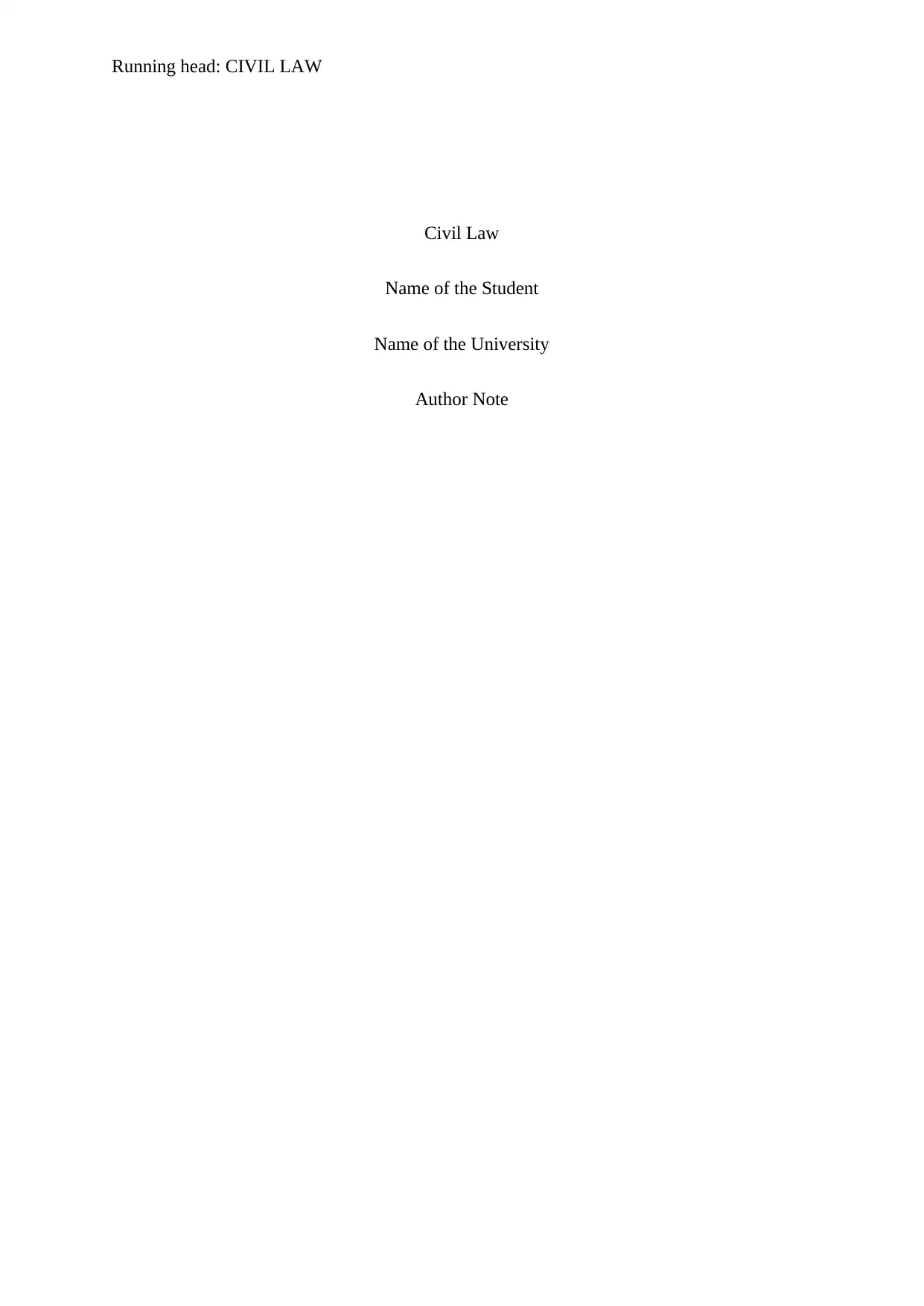
Running head: CIVIL LAW
Civil Law
Name of the Student
Name of the University
Author Note
Civil Law
Name of the Student
Name of the University
Author Note
Paraphrase This Document
Need a fresh take? Get an instant paraphrase of this document with our AI Paraphraser
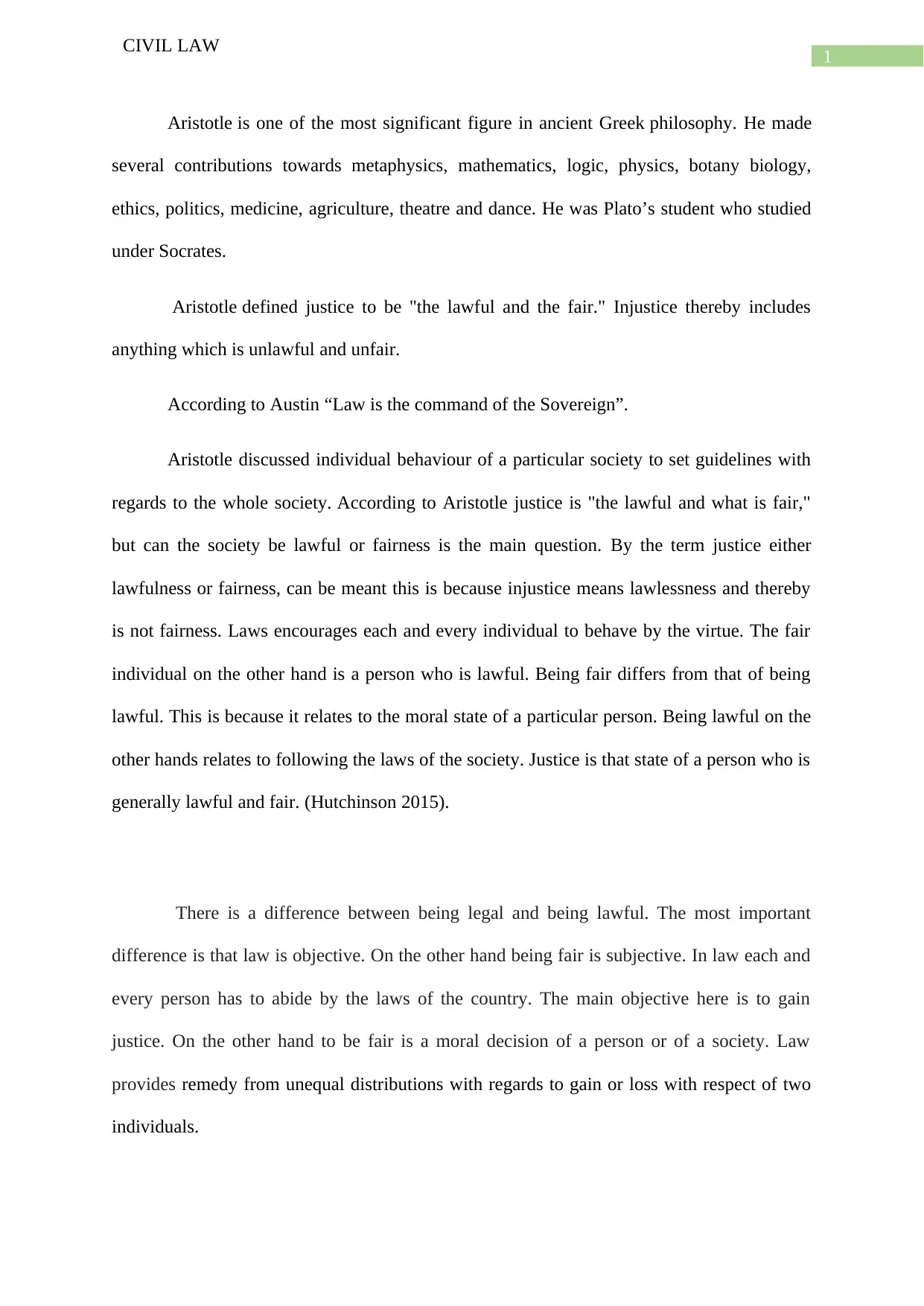
1
CIVIL LAW
Aristotle is one of the most significant figure in ancient Greek philosophy. He made
several contributions towards metaphysics, mathematics, logic, physics, botany biology,
ethics, politics, medicine, agriculture, theatre and dance. He was Plato’s student who studied
under Socrates.
Aristotle defined justice to be "the lawful and the fair." Injustice thereby includes
anything which is unlawful and unfair.
According to Austin “Law is the command of the Sovereign”.
Aristotle discussed individual behaviour of a particular society to set guidelines with
regards to the whole society. According to Aristotle justice is "the lawful and what is fair,"
but can the society be lawful or fairness is the main question. By the term justice either
lawfulness or fairness, can be meant this is because injustice means lawlessness and thereby
is not fairness. Laws encourages each and every individual to behave by the virtue. The fair
individual on the other hand is a person who is lawful. Being fair differs from that of being
lawful. This is because it relates to the moral state of a particular person. Being lawful on the
other hands relates to following the laws of the society. Justice is that state of a person who is
generally lawful and fair. (Hutchinson 2015).
There is a difference between being legal and being lawful. The most important
difference is that law is objective. On the other hand being fair is subjective. In law each and
every person has to abide by the laws of the country. The main objective here is to gain
justice. On the other hand to be fair is a moral decision of a person or of a society. Law
provides remedy from unequal distributions with regards to gain or loss with respect of two
individuals.
CIVIL LAW
Aristotle is one of the most significant figure in ancient Greek philosophy. He made
several contributions towards metaphysics, mathematics, logic, physics, botany biology,
ethics, politics, medicine, agriculture, theatre and dance. He was Plato’s student who studied
under Socrates.
Aristotle defined justice to be "the lawful and the fair." Injustice thereby includes
anything which is unlawful and unfair.
According to Austin “Law is the command of the Sovereign”.
Aristotle discussed individual behaviour of a particular society to set guidelines with
regards to the whole society. According to Aristotle justice is "the lawful and what is fair,"
but can the society be lawful or fairness is the main question. By the term justice either
lawfulness or fairness, can be meant this is because injustice means lawlessness and thereby
is not fairness. Laws encourages each and every individual to behave by the virtue. The fair
individual on the other hand is a person who is lawful. Being fair differs from that of being
lawful. This is because it relates to the moral state of a particular person. Being lawful on the
other hands relates to following the laws of the society. Justice is that state of a person who is
generally lawful and fair. (Hutchinson 2015).
There is a difference between being legal and being lawful. The most important
difference is that law is objective. On the other hand being fair is subjective. In law each and
every person has to abide by the laws of the country. The main objective here is to gain
justice. On the other hand to be fair is a moral decision of a person or of a society. Law
provides remedy from unequal distributions with regards to gain or loss with respect of two
individuals.
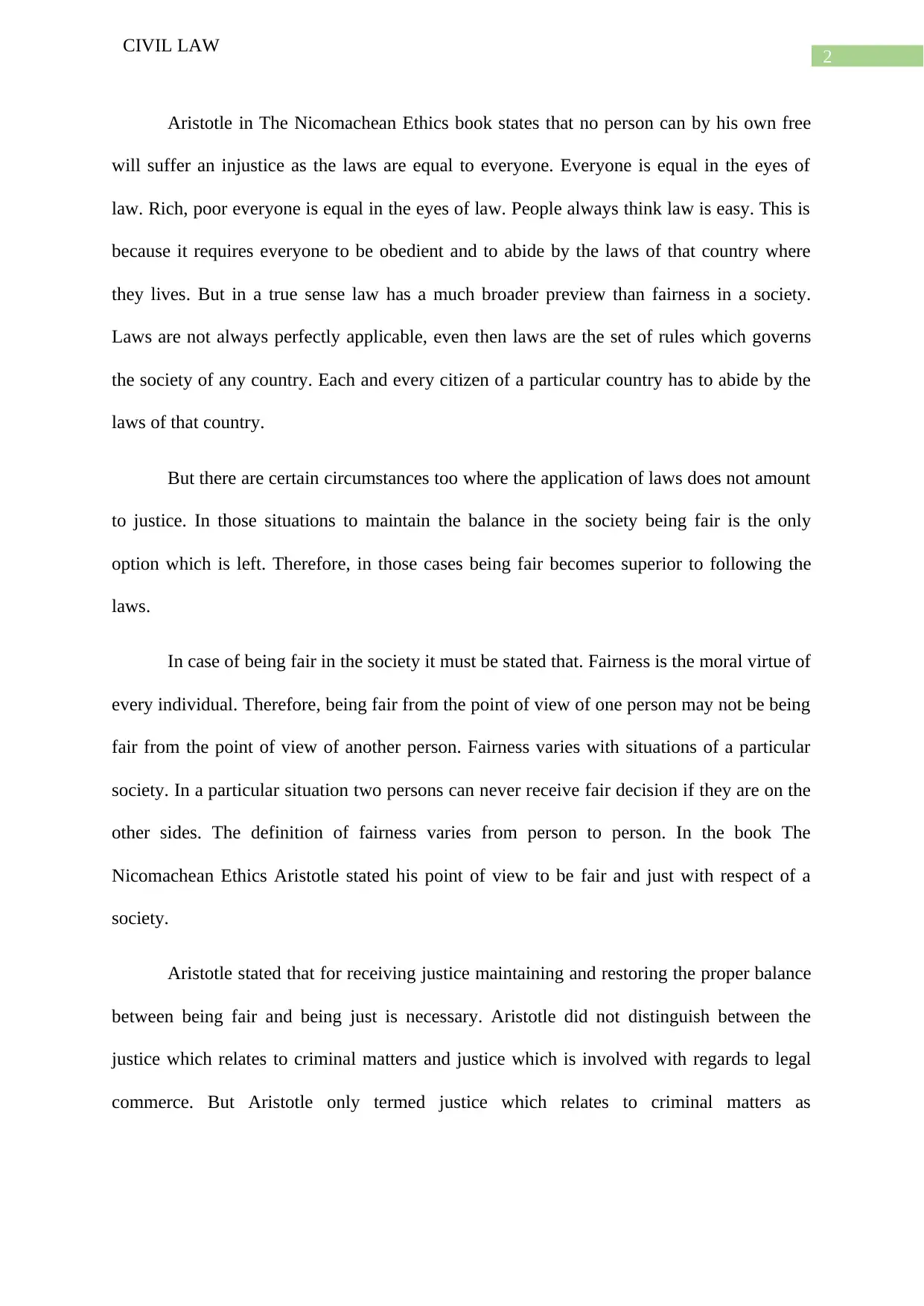
2
CIVIL LAW
Aristotle in The Nicomachean Ethics book states that no person can by his own free
will suffer an injustice as the laws are equal to everyone. Everyone is equal in the eyes of
law. Rich, poor everyone is equal in the eyes of law. People always think law is easy. This is
because it requires everyone to be obedient and to abide by the laws of that country where
they lives. But in a true sense law has a much broader preview than fairness in a society.
Laws are not always perfectly applicable, even then laws are the set of rules which governs
the society of any country. Each and every citizen of a particular country has to abide by the
laws of that country.
But there are certain circumstances too where the application of laws does not amount
to justice. In those situations to maintain the balance in the society being fair is the only
option which is left. Therefore, in those cases being fair becomes superior to following the
laws.
In case of being fair in the society it must be stated that. Fairness is the moral virtue of
every individual. Therefore, being fair from the point of view of one person may not be being
fair from the point of view of another person. Fairness varies with situations of a particular
society. In a particular situation two persons can never receive fair decision if they are on the
other sides. The definition of fairness varies from person to person. In the book The
Nicomachean Ethics Aristotle stated his point of view to be fair and just with respect of a
society.
Aristotle stated that for receiving justice maintaining and restoring the proper balance
between being fair and being just is necessary. Aristotle did not distinguish between the
justice which relates to criminal matters and justice which is involved with regards to legal
commerce. But Aristotle only termed justice which relates to criminal matters as
CIVIL LAW
Aristotle in The Nicomachean Ethics book states that no person can by his own free
will suffer an injustice as the laws are equal to everyone. Everyone is equal in the eyes of
law. Rich, poor everyone is equal in the eyes of law. People always think law is easy. This is
because it requires everyone to be obedient and to abide by the laws of that country where
they lives. But in a true sense law has a much broader preview than fairness in a society.
Laws are not always perfectly applicable, even then laws are the set of rules which governs
the society of any country. Each and every citizen of a particular country has to abide by the
laws of that country.
But there are certain circumstances too where the application of laws does not amount
to justice. In those situations to maintain the balance in the society being fair is the only
option which is left. Therefore, in those cases being fair becomes superior to following the
laws.
In case of being fair in the society it must be stated that. Fairness is the moral virtue of
every individual. Therefore, being fair from the point of view of one person may not be being
fair from the point of view of another person. Fairness varies with situations of a particular
society. In a particular situation two persons can never receive fair decision if they are on the
other sides. The definition of fairness varies from person to person. In the book The
Nicomachean Ethics Aristotle stated his point of view to be fair and just with respect of a
society.
Aristotle stated that for receiving justice maintaining and restoring the proper balance
between being fair and being just is necessary. Aristotle did not distinguish between the
justice which relates to criminal matters and justice which is involved with regards to legal
commerce. But Aristotle only termed justice which relates to criminal matters as
⊘ This is a preview!⊘
Do you want full access?
Subscribe today to unlock all pages.

Trusted by 1+ million students worldwide
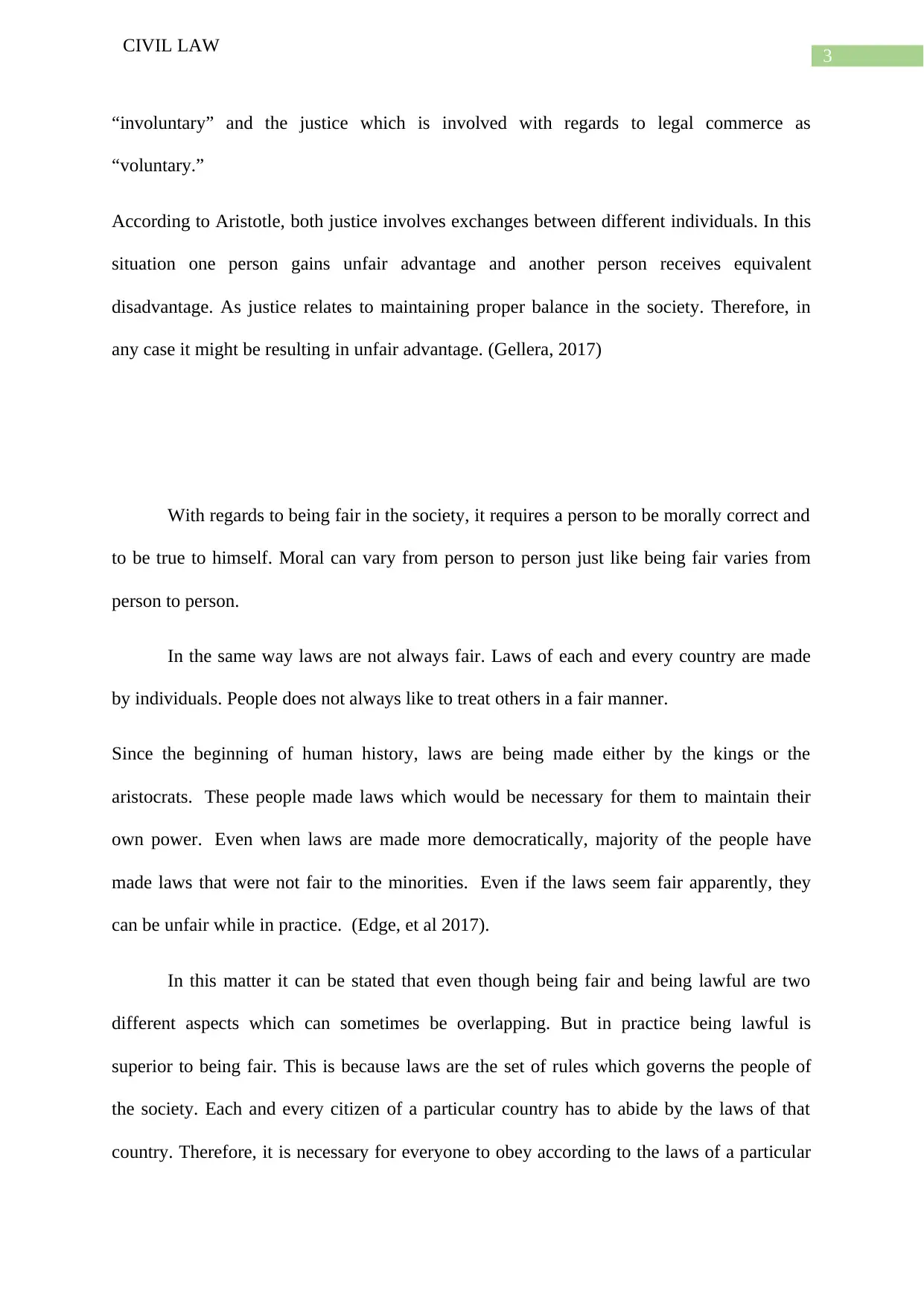
3
CIVIL LAW
“involuntary” and the justice which is involved with regards to legal commerce as
“voluntary.”
According to Aristotle, both justice involves exchanges between different individuals. In this
situation one person gains unfair advantage and another person receives equivalent
disadvantage. As justice relates to maintaining proper balance in the society. Therefore, in
any case it might be resulting in unfair advantage. (Gellera, 2017)
With regards to being fair in the society, it requires a person to be morally correct and
to be true to himself. Moral can vary from person to person just like being fair varies from
person to person.
In the same way laws are not always fair. Laws of each and every country are made
by individuals. People does not always like to treat others in a fair manner.
Since the beginning of human history, laws are being made either by the kings or the
aristocrats. These people made laws which would be necessary for them to maintain their
own power. Even when laws are made more democratically, majority of the people have
made laws that were not fair to the minorities. Even if the laws seem fair apparently, they
can be unfair while in practice. (Edge, et al 2017).
In this matter it can be stated that even though being fair and being lawful are two
different aspects which can sometimes be overlapping. But in practice being lawful is
superior to being fair. This is because laws are the set of rules which governs the people of
the society. Each and every citizen of a particular country has to abide by the laws of that
country. Therefore, it is necessary for everyone to obey according to the laws of a particular
CIVIL LAW
“involuntary” and the justice which is involved with regards to legal commerce as
“voluntary.”
According to Aristotle, both justice involves exchanges between different individuals. In this
situation one person gains unfair advantage and another person receives equivalent
disadvantage. As justice relates to maintaining proper balance in the society. Therefore, in
any case it might be resulting in unfair advantage. (Gellera, 2017)
With regards to being fair in the society, it requires a person to be morally correct and
to be true to himself. Moral can vary from person to person just like being fair varies from
person to person.
In the same way laws are not always fair. Laws of each and every country are made
by individuals. People does not always like to treat others in a fair manner.
Since the beginning of human history, laws are being made either by the kings or the
aristocrats. These people made laws which would be necessary for them to maintain their
own power. Even when laws are made more democratically, majority of the people have
made laws that were not fair to the minorities. Even if the laws seem fair apparently, they
can be unfair while in practice. (Edge, et al 2017).
In this matter it can be stated that even though being fair and being lawful are two
different aspects which can sometimes be overlapping. But in practice being lawful is
superior to being fair. This is because laws are the set of rules which governs the people of
the society. Each and every citizen of a particular country has to abide by the laws of that
country. Therefore, it is necessary for everyone to obey according to the laws of a particular
Paraphrase This Document
Need a fresh take? Get an instant paraphrase of this document with our AI Paraphraser
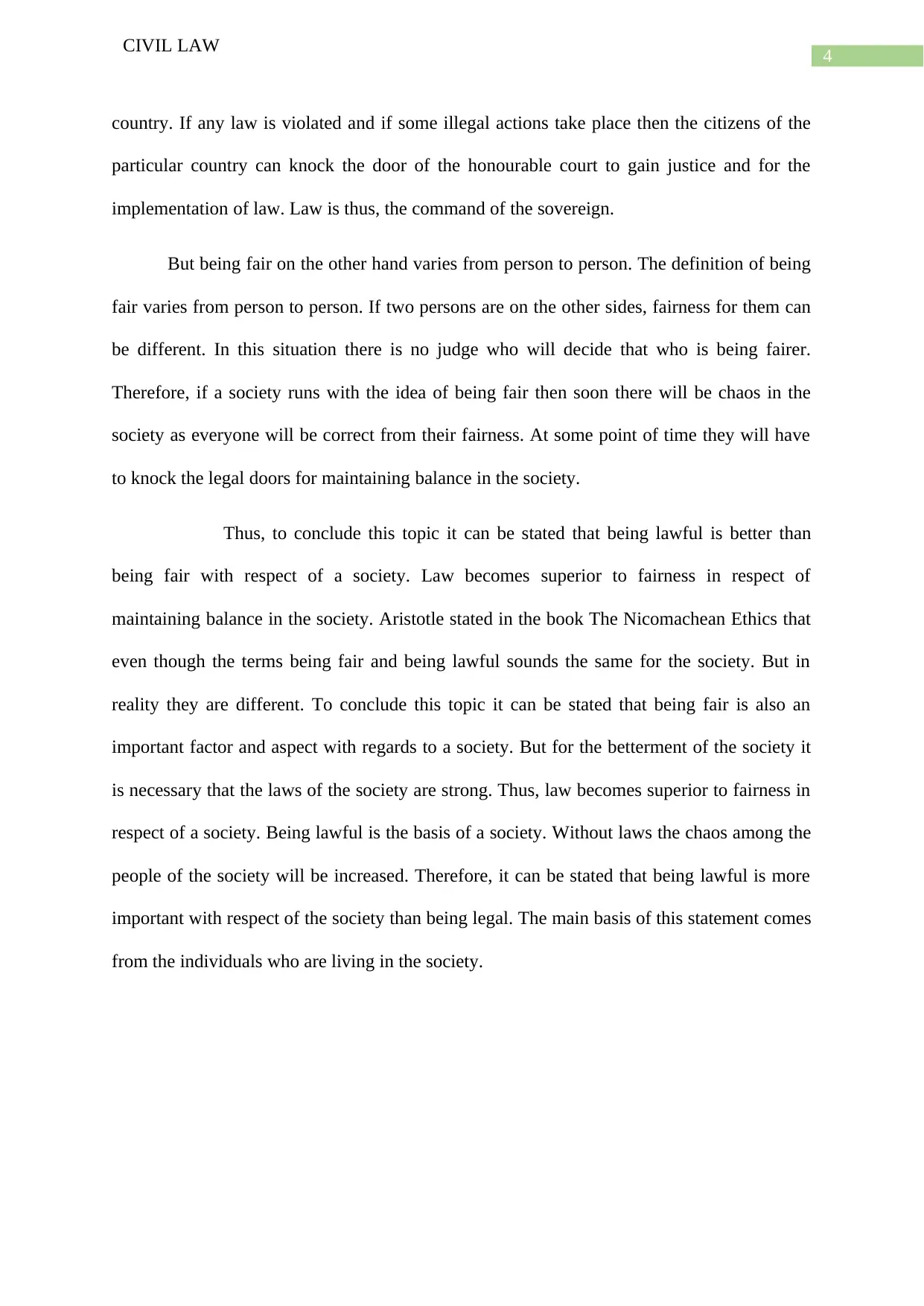
4
CIVIL LAW
country. If any law is violated and if some illegal actions take place then the citizens of the
particular country can knock the door of the honourable court to gain justice and for the
implementation of law. Law is thus, the command of the sovereign.
But being fair on the other hand varies from person to person. The definition of being
fair varies from person to person. If two persons are on the other sides, fairness for them can
be different. In this situation there is no judge who will decide that who is being fairer.
Therefore, if a society runs with the idea of being fair then soon there will be chaos in the
society as everyone will be correct from their fairness. At some point of time they will have
to knock the legal doors for maintaining balance in the society.
Thus, to conclude this topic it can be stated that being lawful is better than
being fair with respect of a society. Law becomes superior to fairness in respect of
maintaining balance in the society. Aristotle stated in the book The Nicomachean Ethics that
even though the terms being fair and being lawful sounds the same for the society. But in
reality they are different. To conclude this topic it can be stated that being fair is also an
important factor and aspect with regards to a society. But for the betterment of the society it
is necessary that the laws of the society are strong. Thus, law becomes superior to fairness in
respect of a society. Being lawful is the basis of a society. Without laws the chaos among the
people of the society will be increased. Therefore, it can be stated that being lawful is more
important with respect of the society than being legal. The main basis of this statement comes
from the individuals who are living in the society.
CIVIL LAW
country. If any law is violated and if some illegal actions take place then the citizens of the
particular country can knock the door of the honourable court to gain justice and for the
implementation of law. Law is thus, the command of the sovereign.
But being fair on the other hand varies from person to person. The definition of being
fair varies from person to person. If two persons are on the other sides, fairness for them can
be different. In this situation there is no judge who will decide that who is being fairer.
Therefore, if a society runs with the idea of being fair then soon there will be chaos in the
society as everyone will be correct from their fairness. At some point of time they will have
to knock the legal doors for maintaining balance in the society.
Thus, to conclude this topic it can be stated that being lawful is better than
being fair with respect of a society. Law becomes superior to fairness in respect of
maintaining balance in the society. Aristotle stated in the book The Nicomachean Ethics that
even though the terms being fair and being lawful sounds the same for the society. But in
reality they are different. To conclude this topic it can be stated that being fair is also an
important factor and aspect with regards to a society. But for the betterment of the society it
is necessary that the laws of the society are strong. Thus, law becomes superior to fairness in
respect of a society. Being lawful is the basis of a society. Without laws the chaos among the
people of the society will be increased. Therefore, it can be stated that being lawful is more
important with respect of the society than being legal. The main basis of this statement comes
from the individuals who are living in the society.
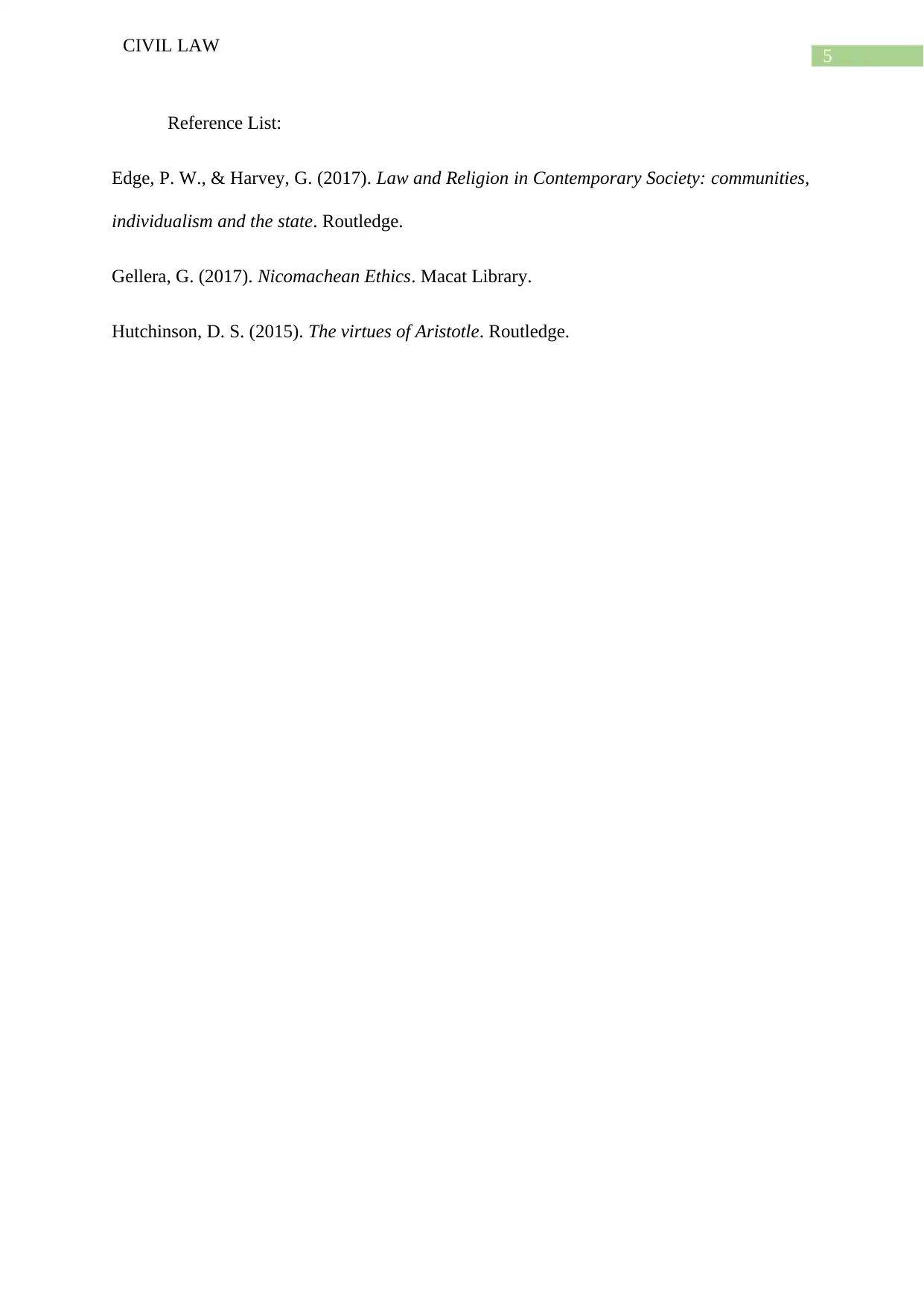
5
CIVIL LAW
Reference List:
Edge, P. W., & Harvey, G. (2017). Law and Religion in Contemporary Society: communities,
individualism and the state. Routledge.
Gellera, G. (2017). Nicomachean Ethics. Macat Library.
Hutchinson, D. S. (2015). The virtues of Aristotle. Routledge.
CIVIL LAW
Reference List:
Edge, P. W., & Harvey, G. (2017). Law and Religion in Contemporary Society: communities,
individualism and the state. Routledge.
Gellera, G. (2017). Nicomachean Ethics. Macat Library.
Hutchinson, D. S. (2015). The virtues of Aristotle. Routledge.
⊘ This is a preview!⊘
Do you want full access?
Subscribe today to unlock all pages.

Trusted by 1+ million students worldwide
1 out of 6
Related Documents
Your All-in-One AI-Powered Toolkit for Academic Success.
+13062052269
info@desklib.com
Available 24*7 on WhatsApp / Email
![[object Object]](/_next/static/media/star-bottom.7253800d.svg)
Unlock your academic potential
Copyright © 2020–2026 A2Z Services. All Rights Reserved. Developed and managed by ZUCOL.





